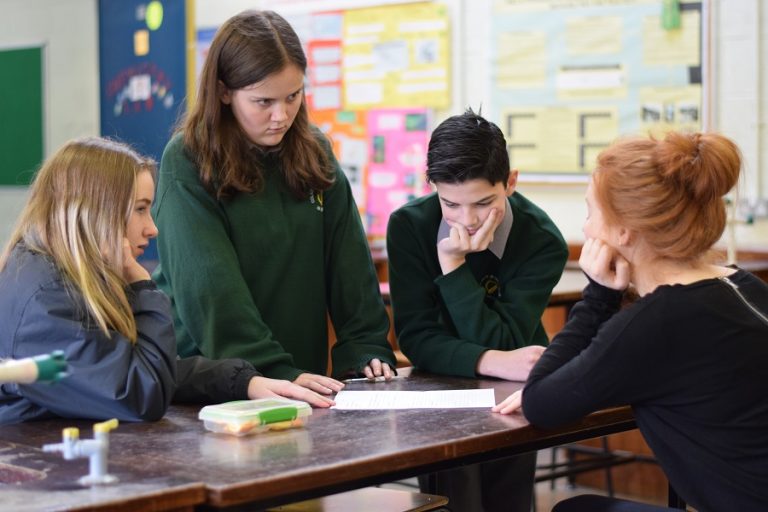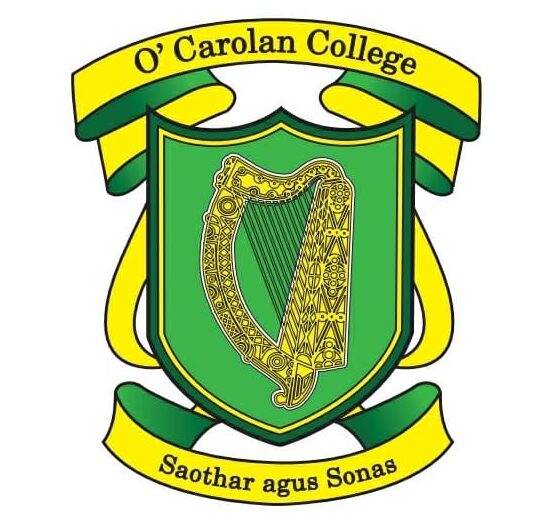JC Science
Junior Cycle Science is a compulsory core subject for all pupils. The new specification for Junior Cycle Science focuses on: the development of students’ knowledge of science through the unifying strand, nature of science, and the four contextual strands: physical world, chemical world, biological world, and Earth and space. Through exploring these four contextual strands, our students develop a sceintifically accurate understanding of the world in which they live. It has been designed for a minimum of 200 hours of timetabled student engagement across the three years of junior cycle. Students will undertake two Classroom-Based Assessments which will involve the students designing their own investigations and research projects. Students will also complete an Assessment Task worth 10% of their final grade before taking a two-hour common level written examination at the end of third year. JCSP Science is also on offer for students needing additional help with Junior Science. One of the key aims of Junior Cycle Science is for students to become scientifically literate, in a world where science and technology is becoming more and more relevant in our day to day lives.


The first CBA is an Extended Experimental Investigation (EEI), which gives students an opportunity to research a question they have about a science-related phenomena which they have come across in the course of the three years of their studies. The development of inquiry, collaborative, practical, recording and reporting skills will be central to this task, activities such as posing questions and making predictions, working with others, designing experiments, conducting experiments, generating and recording primary data, processing and analysing the data to make valid conclusions, and communicating the method used, data recorded, findings, and reflections on the investigation.
The second CBA is a Science in Society Investigation (SSI), which gives students an opportunity to explore a scientific topic or issue. The development of research and reporting skills are central here, for example searching for information, discriminating between sources, documenting sources used, presenting evidence in a report, applying knowledge of science to new situations and analysing different points of view on the issue, drawing conclusions and communicating personal opinion(s) based on the evidence.
Transition Year Science covers many disciplines of Science:
Senior Cycle
Planning & Preparation
- Active Science by Declan Cathart and Russell Harris
- Leaving Certificate Biology by Michael O Callaghan
- Chemistry Live by Declan Kennedy
- Real World Physics by Dan O’Regan
- Breaking Ground by Edco for Leaving Certificate Agricultural Science
- Essential Agricultural Science Workbook by Folens
Assessment at Junior Cycle is based on project work, posters, presentations, chapter tests, Christmas exams and Summer exams. This allows for greater communication between all of the science teachers, and it also enables us to identify students with potential for senior science subjects, as well as identifying students who may require extra help. The Junior Cycle Science course also incorporates classroom-based assessments; an Extended Experimental Investigation in Second Year and a Science in Society Investigation in Third Year.
In the Science department, we employ a variety of teaching methodologies such as theoretical instruction, experimental techniques and investigations, discovery learning, conceptual understanding and inquiry-based learning activities. This variety in teaching methodologies allows the department to offer a wide range of content in many ways to engage our students and educate across the spectrum of Gardner’s styles’ of learning.
This year saw Physics and Chemistry students travel to NUI Maynooth to take part in practical workshops required for their Leaving Cert courses. During these practical workshops, students carried out practical tasks and gained valuable information on a variety of mandatory experiments necessary for each of their Leaving Cert courses. This provided a good opportunity for our students to experience a college laboratory for a day, revise key experiments for their Leaving Certificate exam, to ask advice on science courses and careers, and to just chat to the postgraduate students about the current trends in research in the science community.
The Fifth Year physics group attended a lecture in UCD, entitled “The physics of waves.” This lecture was presented by Dr. Tom McCormack of UCD, as part of the annual series of lectures organised by the Tyndall Institute. The lecture provided an overview of how simple concepts in waves and music help us to understand the everyday world around us, and also help us peer into the distant corners of the universe. The day was full of relevant information for our students, and included a number of fun and interactive demonstrations.
Fifth year Biology students attended a TRY Science event hosted by Athlone Institute of Technology. Students were shown the laboratories and tried out some experiments as well gaining an insight into a range of careers opportunities in the field of science.
This year fifth and sixth year Agricultural Science students attended Ballyhaise Agricultural College. Here, they were given a presentation on each of the courses available to study in the College and information on how to progress onto the next level. The day itself, although very wet, was very enjoyable. The tour was very relevant to the current fifth years as the theme for the ‘Individual Investigative Study’ this year is Sustainability in Agriculture. The speakers spoke about the use of protected urea, the addition of clover to swards and low emission slurry spreading. The tour continued through the Dairy parlour, the grazing paddocks, the beef shed, cattle crush, calving shed with creep area for the calves, and ended with a tour of the sheep shed where mid-season lambing was underway. Here, the students learned about the importance of good record keeping in helping the farmer to identify the best lambs to breed as replacements, and those to cull. An enjoyable day was had by all.
All of the science department attended in-services for the new Junior Cycle, both whole-school and science specific, which is now being implemented with our current First and Second Year students. Physics teacher Richard Moynihan attended the PDST In-Service in Navan, looking at developing problem solving skills in Physics using the Isaac Physics digital suite of materials. Agricultural science teacher Carol Nugent attended the IASTA conference on March 7th, 2020 in Tullamore. Ms Nugent also attended the PDST in- service in Navan, ‘Introduction to Geogebra for Agricultural Science Teachers’, along with two more PDST training days on the new Agricultural science curriculum.
Awards & Grants
The Naughton Scholarship: Each year, 36 students are awarded Naughton Scholarships. There is at least one winner from each County in the Republic of Ireland. The scholarship is intended as a reward and encouragement to exceptional students who would like to study in the STEM field (science, technology, engineering and maths) at University. OCC Alumni Jamie Reilly, Ciaran Corrigan and Sadhbh Leahy have all been recipients of this marvellous scholarship. We are very proud of all these students and we are delighted to see their incredible efforts recognised by national bodies. The school of each winning student also receives prize money which can be used to purchase equipment for the science labs.
The Institute of Biology of Ireland Awards: Biology student Corey Alwell received the Institute of Biology Medal of Excellence for achieving the highest grade in Biology in the Leaving Certificate in 2019. The prize giving event also included Biology teacher Ms. Kathleen Dawson who received a certificate of Teacher Commendation.
Open Night
Senior Science
Agricultural Science is the study of the science and technology underlying the principles and practices of agriculture. It aims to develop knowledge, skills and attitudes regarding the factors which affect the long-term well-being of agricultural resources, and places emphasis on the managed use of these resources. This includes topics such as the study of soils, the general structure and function of plants, farm crops, structure and function of the animal body and animal production. Agricultural science is suited to pupils from a farming background or those who have a great interest in farming and environmental issues and wish to develop their knowledge further. It also suits pupils who wish to undertake a science subject which may be a requirement for their future third level studies. Sixth year pupils usually complete their practical exam in May. Here they discuss their project work and experience gained over the two years in agriculture. The examiner then looks through all the of students project work which has been submitted. The new Agricultural Science curriculum began in September 2019, and it is divided into four main strands: Soils, Crops, Animals and Scientific practices with eight cross cutting themes throughout. This year’s current fifth years will undertake the new ‘Individual Investigative Study’, and the theme this year for their brief is ‘Improving Sustainability in Agriculture’. This replaces the practical exam which used to take place in May of the final year. There are a broad range of careers in Agriculture ranging from Veterinary Surgeon, Agricultural adviser, Environmentalist, Horticulturist, Botany, Crop adviser, Teaching, Animal breeder, AI technician, Agribusiness and sales and Forestry to name but a few.
Biology is the study of life. This includes the exploration of the diversity of life and the inter-relationship between organisms and their environment. Students will develop an understanding and knowledge of the unit of life – the cell – whose structures and processes are shared by all living organisms and, in so doing, gain an insight into the uniqueness, function and role of organisms, including themselves. Students also learn how other living organisms and their products are used to enhance human health and the human environment, and make informed evaluations about contemporary biological issues. It is intended that the biology syllabus will prove relevant to the lives of students and inspire them to take an interest in biology, and to instill an excitement in them about the topic. Studying Biology is essential for students who wish to pursue careers in the following areas: Medicine, Physiotherapy, Veterinary Studies, Food Science, Horticulture, Immunology, Marine Biology, Nutrition, Pathology, Pharmacology, Physiology, Science Education and Forensic Science.
Chemistry is the branch of science concerned with the structure and composition of the substances which make up the world around us. Chemistry is a key subject required for many Third Level courses and careers such as Medicine, Dentistry, Pharmacy, Food Science, Ag Science, Sport Science and Engineering. Topics studied include Organic Chemistry, Atomic structure, History of the Atom, The Mole concept, The Periodic table, Chemical bonding, Rates of reactions, The Gas laws and Volumetric analysis. The aims of the syllabus are:
- To stimulate and sustain students’ interest in, and enjoyment of, chemistry
- To provide a relevant course for those students who will complete their study of chemistry at this level
- To provide a foundation course in chemistry for those students who will continue their studies in chemistry or in related subjects
- To encourage an appreciation of the scientific, social, economic, environmental and technological aspects of chemistry and an understanding of the historical development of chemistry
- To illustrate generally how humanity has benefitted from the study and practice of chemistry
- To develop an appreciation of scientific method and rational thought
- To develop skills in laboratory procedures and techniques, carried out with due regard for safety, together with the ability to assess the uses and limitations of these procedures
- To develop skills of observation, analysis, evaluation, communication and problem solving.
